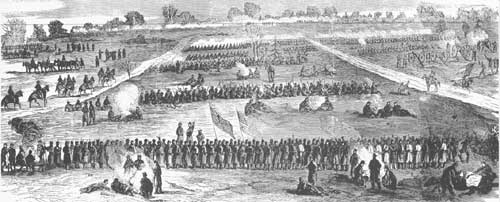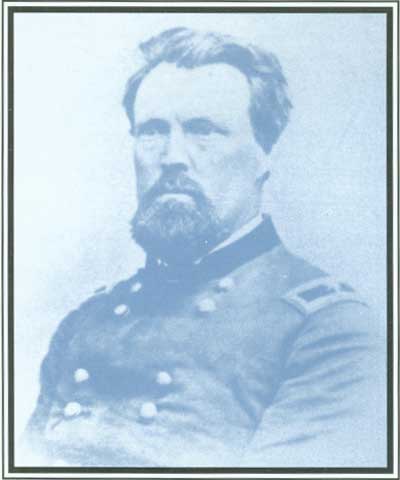|
NEW YEAR'S INTERLUDE
A heavy mist rolled over the battlefield. Above, a waxing moon
drifted in and out of the clouds; below, the ground, churned to paste by
thousands of feet, began to freeze as the temperature plummeted. The
"dismal groans and cries of the wounded and dying," punctuated by the
rumbling of ambulances, replaced the crash of musketry and the roar of
artillery. At midnight, Rosecrans and his lieutenants gathered to ponder
the fate of the army. Twenty-four hours earlier, confident of success,
Rosecrans had summoned his generals only to issue orders to them; now,
his plan of battle foiled before it could be launched and his army
nearly annihilated, Rosecrans was open to suggestions. Eyewitness
accounts of the gathering vary: Rosecrans's own version finds Thomas and
Crittenden deferring to his judgment and McCook advising retreat;
Crittenden, on the other hand, recalled that there was some talk of
retreat, although he was uncertain who started it.

|
SKETCH FROM HARPER'S WEEKLY SHOWING THE CENTER OF THE ARMY ON
JANUARY 2, 1863.
|
Regardless of who said what, the opinions of his lieutenants were
insufficient to sway Rosecrans one way or the other, and he decided to
inspect the ground to the army's rear personally before making a
decision. Asking his generals to await his return, Rosecrans and McCook
rode off toward Overall Creek. Along the creek, torches flickered and
danced. "They have got entirely in our rear and are forming a line of
battle by torchlight," Rosecrans surmised. McCook agreed, and the two
returned to headquarters. Rosecrans ended the council, telling his
generals to rejoin their commands and prepare to "fight or die."
Gallant words, but Rosecrans had erred. The torches he had seen were
not those of enemy guides; rather, they were firebrands carried by
Federal cavalrymen to ignite the campfires of infantrymen who, numbed
almost senseless by the bitter cold, chose to flaunt Rosecrans's
standing order prohibiting fires.

|
COLONEL SAMUEL BEATTY (USAMHI)
|
There was no talk of retreat at the headquarters of the Army of
Tennessee. Bragg was satisfied with the army's performance and
confident that the New Year would find him in sole possession of the
battlefield. Although daybreak on January 1 found the Federals still out
in front in force, Bragg remained certain of Rosecrans's eventual
withdrawal.
While Bragg's army lay on its arms, Rosecrans strengthened his lines.
At 3:00 A.M. of the New Year, he directed Crittenden to occupy the high
ground above Mcfadden's Ford on the east bank. At dawn, Sam Beatty (in
command of the division after a painful wound forced Van Cleve to leave
the battle) moved to execute the order. As the day passed and
the Federals entrenched, the feeling grew in the Army of Tennessee that
victory was slowly slipping from its grasp. Wrote a Kentuckian: "This
gloomy New Year's day went by with the Confederate troops inactive; and
even before its noon the golden opportunity had passed away from General
Bragg. . . . As the Federal army had nothing to lose but everything to
gain by waiting, it waited—but meanwhile it worked. The
Confederate army waited, and hoped."
|
|
